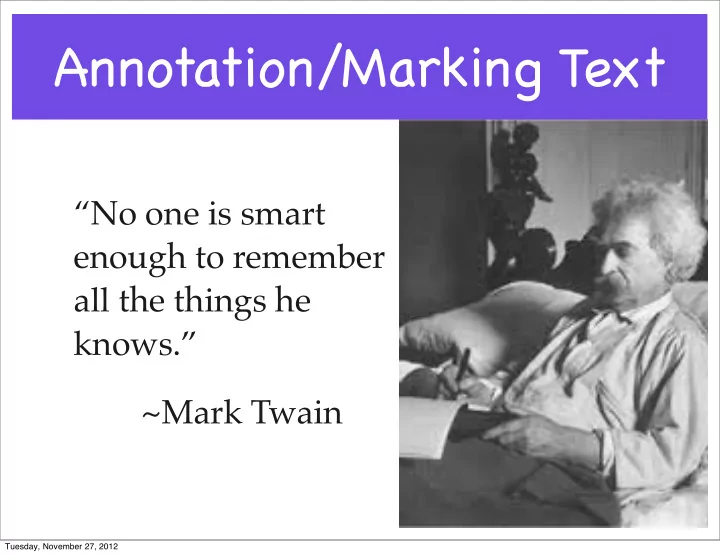

Annotation/Marking Text “No one is smart enough to remember all the things he knows.” ~Mark Twain Tuesday, November 27, 2012
Why bother? Tuesday, November 27, 2012
Why bother? • To maintain engagement while reading in order to ensure metacognition Tuesday, November 27, 2012
Why bother? • To maintain engagement while reading in order to ensure metacognition • To monitor comprehension Tuesday, November 27, 2012
Why bother? • To maintain engagement while reading in order to ensure metacognition • To monitor comprehension • To provide a way for students to “hold” their thinking Tuesday, November 27, 2012
Why bother? • To maintain engagement while reading in order to ensure metacognition • To monitor comprehension • To provide a way for students to “hold” their thinking • To make students’ thinking visible to the teacher Tuesday, November 27, 2012
What do you think of when you hear the word “metacognition?” Tuesday, November 27, 2012
What is metacognition? meta · cog · ni · tion: awareness or analysis of one's own learning or thinking processes; ! thinking about thinking. Tuesday, November 27, 2012
ANNOTATION: It isn’ t... Tuesday, November 27, 2012
ANNOTATION: It isn’ t... • ...finding one right answer. Tuesday, November 27, 2012
ANNOTATION: It isn’ t... • ...finding one right answer. • ...reckless highlighting. Tuesday, November 27, 2012
ANNOTATION: It isn’ t... • ...finding one right answer. • ...reckless highlighting. • ...note taking. Tuesday, November 27, 2012
ANNOTATION: It isn’ t... • ...finding one right answer. • ...reckless highlighting. • ...note taking. • ...a waste of time. Tuesday, November 27, 2012
ANNOTATION: It is... Tuesday, November 27, 2012
ANNOTATION: It is... • ...a critical reading skill that needs to be explicitly taught. Tuesday, November 27, 2012
ANNOTATION: It is... • ...a critical reading skill that needs to be explicitly taught. • ...something that can be implemented in every class. Tuesday, November 27, 2012
ANNOTATION: It is... • ...a critical reading skill that needs to be explicitly taught. • ...something that can be implemented in every class. • ...key to critical thinking. Tuesday, November 27, 2012
How do we teach it???? Tuesday, November 27, 2012
Teacher Modeling As “the best reader in the room,” the teacher can simply show thinking by marking the text in front of the class. Tuesday, November 27, 2012
Guided Practice Teacher and students annotate the same text together. Start small and encourage students’ thinking. Tuesday, November 27, 2012
Sentence starters can help ! Tuesday, November 27, 2012
Sentence starters can help ! • I’m wondering... • This reminds me of... • I don’t understand... • I’m picturing... • I noticed... • I’d like to know... Tuesday, November 27, 2012
We’ve annotated. Now what? Tuesday, November 27, 2012
We’ve annotated. Now what? • Use annotated text for whole-class or small group discussion Tuesday, November 27, 2012
We’ve annotated. Now what? • Use annotated text for whole-class or small group discussion • Because students have read metacognitively, they will be more capable of writing to a critical thinking question. Tuesday, November 27, 2012
Let’ s try it! Tuesday, November 27, 2012
Let’ s try it! • Turn to p. 79 in the excerpt from Focus Tuesday, November 27, 2012
Let’ s try it! • Turn to p. 79 in the excerpt from Focus • Read the section titled “Modeling Higher-Order Reading” pp. 79-81 Tuesday, November 27, 2012
Let’ s try it! • Turn to p. 79 in the excerpt from Focus • Read the section titled “Modeling Higher-Order Reading” pp. 79-81 • Try two or three of the sentence starters to add annotations to this section (see handout) Tuesday, November 27, 2012
Table Talk • What did you learn? • What questions do you have? • Record notes as a group Tuesday, November 27, 2012
Department Practice Using the article that you selected, work together and share ideas for teaching annotation in your subject area. Tuesday, November 27, 2012
Recommend
More recommend